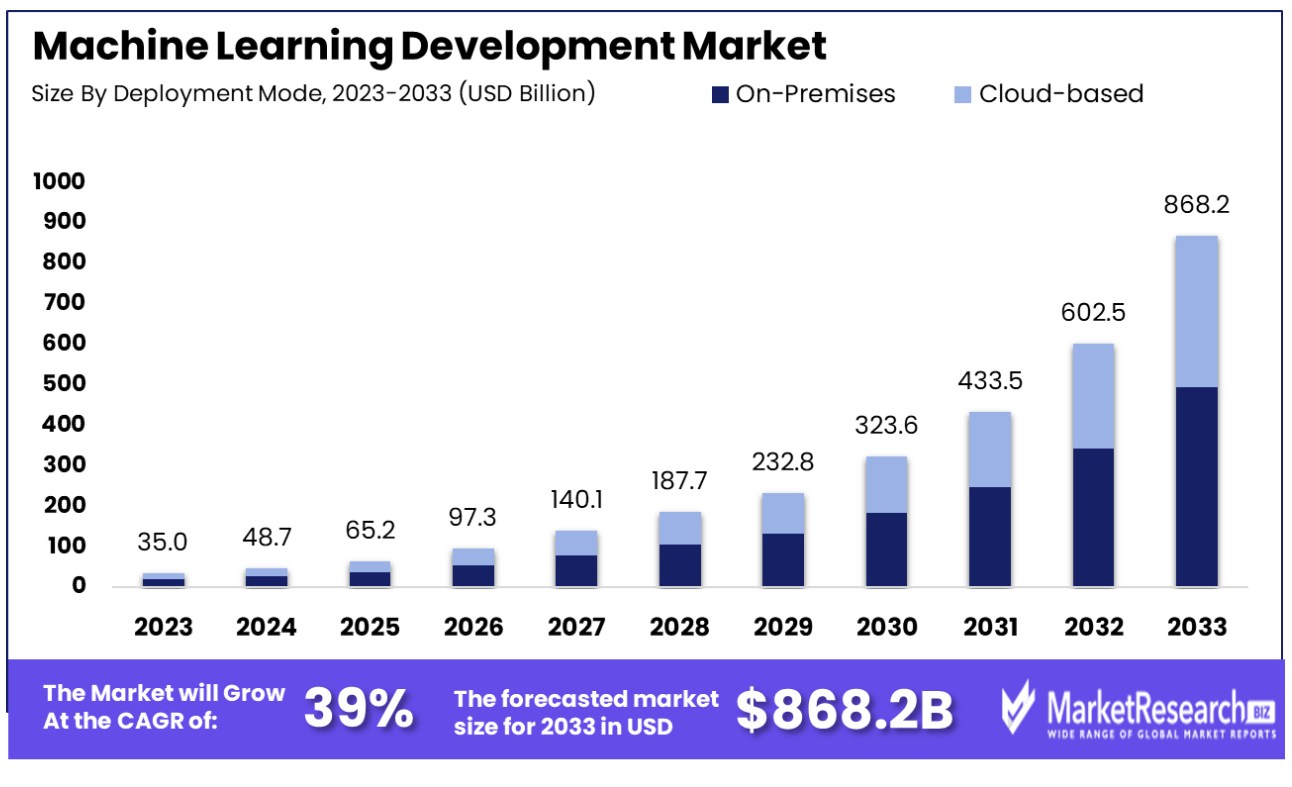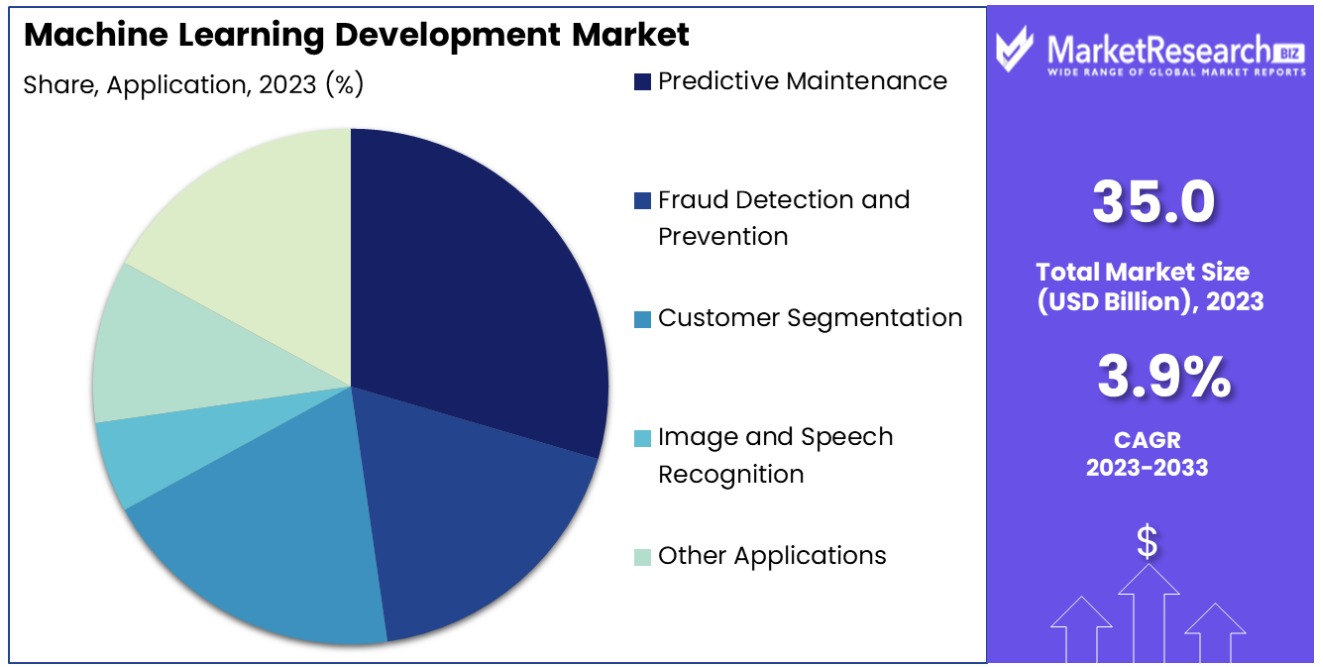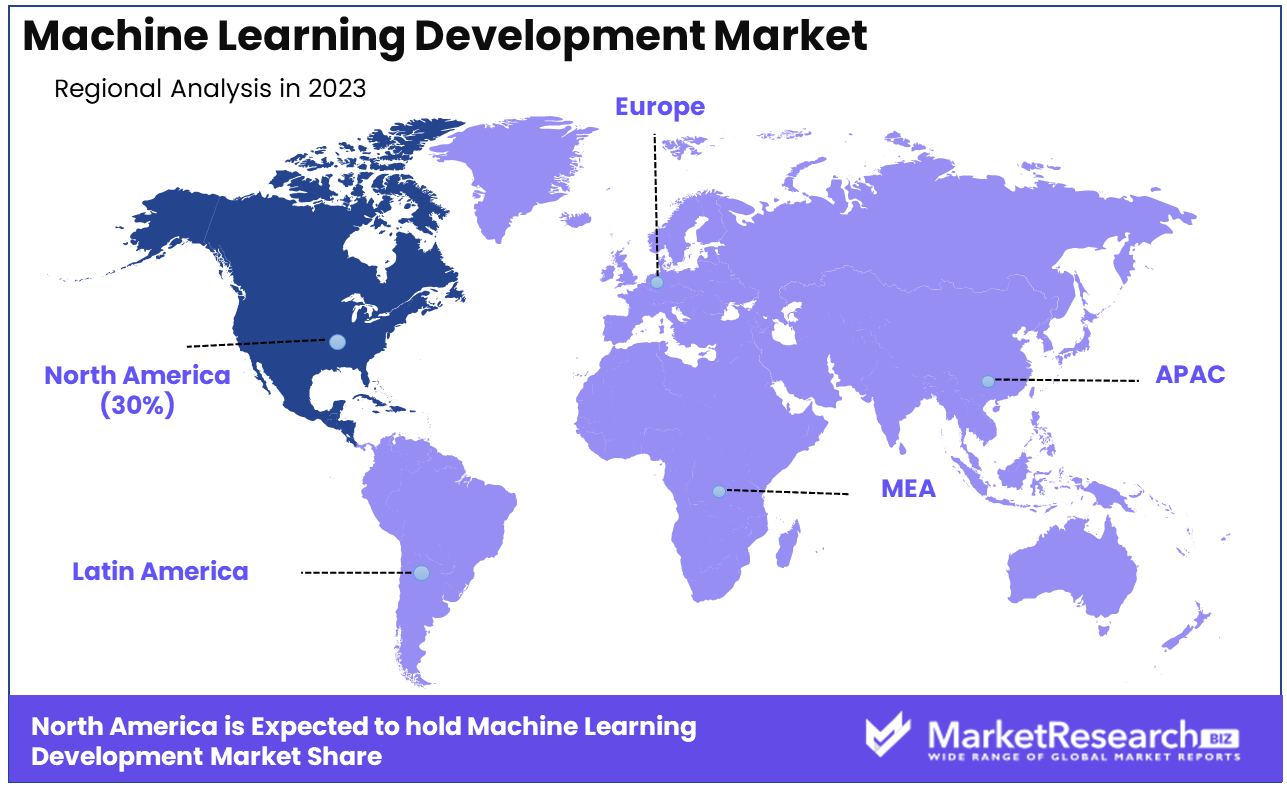
Machine Learning Development Market By Deployment Mode(On-Premises, Cloud-based), By Application(Predictive Maintenance, Fraud Detection and Prevention, Customer Segmentation, Image and Speech Recognition, Other Applications), By End-User(Healthcare, Finance, Retail, Manufacturing, IT and Telecom, Other End-Users), By Region And Companies - Industry Segment Outlook, Market Assessment, Competition Scenario, Trends, And Forecast 2024-2033
-
43810
-
Feb 2022
-
161
-
-
This report was compiled by Vishwa Gaul Vishwa is an experienced market research and consulting professional with over 8 years of expertise in the ICT industry, contributing to over 700 reports across telecommunications, software, hardware, and digital solutions. Correspondence Team Lead- ICT Linkedin | Detailed Market research Methodology Our methodology involves a mix of primary research, including interviews with leading mental health experts, and secondary research from reputable medical journals and databases. View Detailed Methodology Page
-
Quick Navigation
Report Overview
The Machine Learning Development Market was valued at USD 35.0 Billion in 2023. It is expected to reach USD 868.2 billion by 2033, with a CAGR of 39% during the forecast period from 2024 to 2033.
The Machine Learning Development Market is a dynamic and rapidly evolving sector characterized by the convergence of computational algorithms, data science, and artificial intelligence technologies aimed at enabling machines to learn from and make decisions based on data.

This market includes a broad spectrum of activities, from the development of algorithms and models that can predict outcomes and enhance decision-making processes, to the integration of machine learning capabilities into software applications and business operations. Stakeholders in this market range from technology startups and established software companies to academic institutions and research organizations, all driving innovation in machine learning applications across diverse industries such as healthcare, finance, automotive, and retail.
In the rapidly evolving landscape of the Machine Learning Development Market, 2023 has marked significant strides in innovation and adoption across global industries. The proliferation of technological advancements in artificial intelligence and machine learning has been the cornerstone of this growth, driving the market forward with new capabilities and applications. Enhanced by the surge in computational power and data availability, alongside advanced algorithms, businesses now unlock unprecedented opportunities for harnessing predictive analytics, automating processes, and enhancing decision-making.
A transformative shift has been noted with the rise of cloud-based machine learning platforms, which democratize access to powerful AI tools and resources. This trend significantly lowers the barriers to entry for small and medium-sized enterprises (SMEs), enabling them to leverage machine learning technologies for data analysis and insights, thus fostering competitive advantage and innovation. The inclusivity afforded by cloud platforms catalyzes a broader market landscape where businesses of all sizes can implement AI solutions efficiently.
The sector's expansion is further propelled by specific applications across industries, from predictive maintenance in manufacturing to personalized experiences in retail and advanced diagnostics in healthcare. Machine learning's versatility continually unveils new growth avenues, meeting diverse industry needs.
According to IDC, the accelerated AI server market, critical for targeted capabilities in image and data-intensive training, is anticipated to grow by 28% annually, reaching $18B by 2024. This underscores the growing infrastructure supporting machine learning developments.
Moreover, as machine learning (ML) and artificial intelligence (AI) technologies find increasing applications in international development, there's a pressing need for development practitioners to engage in the design and implementation of ML/AI-based projects. While data science skills are crucial for building and maintaining these technologies, the expertise of a diverse range of development practitioners is equally imperative, highlighting the interdisciplinary approach required for impactful deployment.
Key Takeaways
- Market Growth: Machine Learning Development Market was valued at USD 35.0 Billion in 2023 and is expected to reach USD 868.2.7 Billion in 2033, at a CAGR of 39%
- By Deployment Mode Analysis: On-premises deployment models held a dominant market position with 64% share in the Machine Learning Development Market
- By Application Analysis: Predictive Maintenance held a dominant market position with a 27% share in the Machine Learning Development Market
- By End-User Analysis: Finance held a dominant market position in the Machine Learning Development Market, capturing more than a 25% share.
- Regional Dominance: North America, with a dominating share of 30%.
Driving factors
Continuous Development of AI and Machine Learning Technologies
The relentless pace at which Artificial Intelligence (AI) and machine learning technologies are advancing serves as the bedrock for the Machine Learning Development Market's expansion. These advancements are not only refining the capabilities and efficiency of machine learning algorithms but also expanding their applicability across a myriad of sectors. The continuous development in neural networks, deep learning, and cognitive computing is enabling machines to tackle more complex tasks, analyze vast datasets, and deliver insights with unprecedented accuracy. This technological evolution is a key driver, as it attracts substantial investment and research interest, aiming to harness these technologies for innovative applications, thereby fueling market growth.
Rising Demand for AI-Driven Managed Services
The increasing necessity for AI in services, especially managed services, significantly propels the Machine Learning Development Market forward. Organizations are seeking to leverage AI and machine learning not just as tools for automation, but as strategic assets that can drive business transformation. Managed services powered by AI are in high demand for their ability to enhance operational efficiency, reduce costs, and provide actionable insights without the need for extensive in-house expertise. This demand catalyzes the growth of the market by encouraging the development of new solutions and services that are more intelligent, scalable, and tailored to the specific needs of businesses.
Sector-Wide Adoption of Machine Learning
The adoption of machine learning across various sectors such as healthcare, finance, and retail acts as a significant growth accelerator for the market. In healthcare, machine learning is revolutionizing patient care and research, enabling the analysis of complex medical data at scale and improving diagnostic accuracy. The finance sector leverages machine learning for risk assessment, fraud detection, and personalized customer services, enhancing security and customer experience. Retailers use machine learning to optimize supply chains, predict trends, and personalize shopping experiences. The widespread adoption across these sectors not only demonstrates the versatility and impact of machine learning but also drives demand for development services, tools, and platforms, further expanding the market.
Restraining Factors
Impact of Algorithmic Errors on Market Growth
The potential for errors in machine learning algorithms represents a significant constraint on the Machine Learning Development Market's expansion. These errors, arising from biases in data, overfitting, or incorrect algorithm selection, can lead to inaccurate predictions or faulty decision-making processes. The consequences of such errors are far-reaching, particularly in critical applications like healthcare or autonomous vehicles, where they can undermine user trust and lead to regulatory scrutiny. This concern acts as a restraint on market growth, as organizations may exhibit caution in adopting machine learning solutions, demanding higher accuracy and reliability before implementation.
Technical Expertise Deficit as a Growth Barrier
The scarcity of technical expertise in the field of machine learning and AI poses another considerable hurdle to the market's growth. The development, deployment, and maintenance of machine learning models require a specialized set of skills that are currently in short supply relative to demand. This talent gap can slow down innovation, limit the scalability of machine learning solutions, and increase the costs associated with hiring or training skilled personnel. Consequently, the absence of sufficient technical expertise restricts the ability of businesses to fully leverage machine learning technologies, thus inhibiting market expansion.
Challenges Posed by Overestimated Results
Overestimating the capabilities and delivery of results by machine learning systems can also challenge the Machine Learning Development Market's growth. The hype surrounding AI and machine learning often leads to unrealistic expectations regarding what these technologies can achieve in the short term. When the actual outcomes do not align with these elevated expectations, it can result in disappointment and skepticism among stakeholders. This disillusionment may deter future investments and slow down the adoption of machine-learning solutions, as businesses become more cautious and critical of the claims made by solution providers.
By Deployment Mode Analysis
On-premises deployment models held a dominant market position with 64% share in the Machine Learning Development Market, signifying a traditional preference among organizations for maintaining direct control over their AI and machine learning infrastructure. This approach has been particularly prevalent in industries with stringent data security and regulatory compliance requirements, such as finance and healthcare, where the sensitivity of data necessitates enhanced protection measures that on-premises solutions can more reliably offer. The preference for on-premises models reflects concerns over data privacy, security, and the need for customized integration with existing IT environments, driving investments in infrastructure that supports machine learning development within the physical premises of an organization.
However, the Cloud-based segment of the Machine Learning Development Market is experiencing rapid growth, driven by its scalability, flexibility, and cost-effectiveness. Cloud-based platforms enable businesses of all sizes to access advanced machine learning tools and computational resources without the significant upfront investment required for on-premises setups. This deployment model facilitates easier collaboration, faster deployment of machine learning models, and access to a broader range of services and technologies. As security measures and regulatory compliance capabilities of cloud services continue to improve, an increasing number of organizations are transitioning to cloud-based machine learning solutions. This shift is anticipated to significantly alter the market dynamics, potentially challenging the dominance of on-premises deployments in the coming years.
By Application Analysis
In 2023, Predictive Maintenance held a dominant market position with 27% share in the Machine Learning Development Market, illustrating its critical role in optimizing operations across various industries. This application harnesses machine learning algorithms to predict equipment failures before they occur, allowing businesses to perform maintenance proactively rather than reactively. The adoption of predictive maintenance not only reduces downtime but also extends the lifespan of equipment, leading to substantial cost savings and efficiency improvements. Industries such as manufacturing, energy, and transportation have been particularly keen on integrating these solutions, driven by the tangible ROI predictive maintenance offers by minimizing unplanned outages and enhancing operational reliability.
Fraud Detection and Prevention follows closely, leveraging machine learning's ability to analyze patterns and identify anomalies that could indicate fraudulent activities. Financial institutions, e-commerce platforms, and cybersecurity firms have been pivotal in adopting these systems. By analyzing vast datasets in real-time, these models can flag suspicious transactions or behaviors, significantly reducing the risk of financial loss and enhancing customer trust.

Customer Segmentation has also seen substantial growth, as businesses strive to tailor their marketing strategies more effectively. Machine learning algorithms dissect large customer datasets to identify distinct groups based on purchasing behavior, preferences, and demographic information. This segmentation enables companies to craft personalized marketing messages, improve customer engagement, and drive sales.
Image and Speech Recognition technologies have made remarkable strides, powered by deep learning advancements. These applications are transforming sectors like healthcare, with image recognition facilitating faster, more accurate medical diagnoses, and speech recognition enhancing patient care through voice-activated assistants and transcription services. The retail and automotive industries are also beneficiaries, using image recognition for inventory management and speech recognition for improving user interfaces in vehicles.
The "Other Applications" segment encompasses a wide array of emerging machine learning applications, from natural language processing used in chatbots and virtual assistants to recommendation systems that enhance user experiences on streaming and e-commerce platforms. Each of these applications contributes to the market's depth and diversity, underscoring the vast potential of machine learning to revolutionize business operations and customer interactions across the board.
By End-User Analysis
In 2023, Finance held a dominant market position in the Machine Learning Development Market, capturing more than a 25% share. This prominence is attributed to the sector's rapid adoption of machine learning technologies for fraud detection, risk management, algorithmic trading, and personalized customer services. Financial institutions are leveraging machine learning to enhance decision-making processes, optimize operations, and deliver superior customer experiences, driving significant investments in this technology. The ability of machine learning to analyze vast amounts of financial data in real time and predict market trends has been particularly transformative, offering a competitive edge in a highly regulated and competitive sector.
Healthcare follows closely, with machine learning applications revolutionizing patient care, diagnostics, treatment personalization, and operational efficiencies. The integration of machine learning in healthcare is facilitating early disease detection, predictive analytics for patient monitoring, and the development of new treatment methodologies. The sector's focus on improving patient outcomes and reducing care costs contributes to the growing adoption of these technologies, promising substantial growth potential.
Retail stands out as well, utilizing machine learning for customer segmentation, inventory management, recommendation systems, and enhancing the overall shopping experience. By leveraging data analytics, retailers are personalizing marketing strategies, optimizing supply chains, and improving customer engagement, which in turn drives sales and customer loyalty.
Manufacturing's adoption of machine learning is focused on predictive maintenance, quality control, and supply chain optimization. The ability to predict equipment failures before they occur and ensure product quality standards are consistently met has made machine learning an invaluable tool for increasing operational efficiency and reducing costs in the manufacturing sector.
IT and Telecom are harnessing machine learning for network optimization, service management, and customer support. Machine learning technologies are being used to predict network failures, optimize traffic management, and personalized customer services, thereby enhancing operational efficiencies and customer satisfaction.
Other End-Users segment encompasses sectors such as automotive, education, and energy, each exploring machine learning for a variety of applications, from autonomous driving and personalized learning to energy consumption optimization and predictive maintenance. The versatility and broad applicability of machine learning technologies suggest a continued expansion across these diverse sectors.
Key Market Segments
By Deployment Mode
- On-Premises
- Cloud-based
By Application
- Predictive Maintenance
- Fraud Detection and Prevention
- Customer Segmentation
- Image and Speech Recognition
- Other Applications
By End-User
- Healthcare
- Finance
- Retail
- Manufacturing
- IT and Telecom
- Other End-Users
Growth Opportunity
Technological Advancements Driving Market Growth:
The ongoing advancements in machine learning (ML) and artificial intelligence (AI) technologies are at the forefront of market growth. Enhanced computational algorithms, improved data analytics capabilities, and the development of more sophisticated models are enabling more accurate predictions, better decision-making, and innovative solutions across industries. These technological strides are not only expanding the applicability of ML but are also improving the efficiency and effectiveness of solutions offered, fostering a compound annual growth rate (CAGR) that significantly outpaces many other sectors.
Rise of Cloud-Based ML Platforms Enhancing Accessibility:
The emergence and expansion of cloud-based machine learning platforms have democratized access to ML technologies, making it simpler and more cost-effective for businesses to adopt these powerful tools. This shift has lowered the entry barriers for companies of all sizes, allowing them to leverage scalable computing resources and state-of-the-art ML models without substantial upfront investments in hardware and specialized personnel.
SMEs Embracing ML for Competitive Advantage:
Small and medium-sized enterprises (SMEs) are increasingly turning to machine learning technologies to unearth valuable insights from their data. This trend is driving competitive advantages in various sectors by enabling SMEs to personalize offerings, optimize operations, and enhance customer experiences more effectively. The adoption of ML among SMEs is contributing to market growth, as it widens the base of users and applications, fostering innovation and diversity in use cases.
Latest Trends
Democratization of AI Technologies:
The proliferation of open-source AI models and tools has significantly democratized access to cutting-edge AI technologies. This trend facilitates a more inclusive environment for innovation, enabling startups and established enterprises alike to experiment with and deploy advanced AI solutions without the prohibitive costs traditionally associated with proprietary systems. Consequently, the market has seen a broadening of the innovation base, fostering a more competitive ecosystem.
Surging Demand for Skilled Professionals:
Alongside technological advancements, there's an escalating demand for skilled machine learning and AI professionals. This trend is driven by the expanding application of AI across industries—from healthcare to finance, requiring a workforce proficient in these technologies. The demand-supply gap for AI talent is expected to propel higher salaries and investment in training programs, further stimulating market growth.
Regional Analysis
North America, with a dominating share of 30%, lead the market.
The Machine Learning Development Market witnessed varied growth dynamics across different regions, reflecting diverse technological adoption rates and industry needs. underpinned by a robust technological infrastructure, a highly competitive business environment, and significant investments in AI and machine learning startups. This region, especially the United States, serves as a hub for innovation, with tech giants and startups alike driving advancements in machine learning applications across industries.

Europe followed, showcasing strong growth driven by increased regulatory support for digital transformation and privacy-preserving machine learning technologies. Initiatives such as GDPR have spurred innovations in secure and ethical AI, making Europe a leader in responsible AI development. The region's focus on integrating machine learning in healthcare, finance, and manufacturing sectors further contributed to its market share.
The Asia Pacific region experienced the fastest growth rate, fueled by the digitalization efforts of emerging economies, particularly China and India. Investments in AI research and development, coupled with the adoption of machine learning in e-commerce and manufacturing, propelled the region's market expansion.
Meanwhile, the Middle East & Africa and Latin America regions are gradually embracing machine learning technologies, with growth driven by sectors such as finance, healthcare, and telecom. These regions present untapped opportunities, with governments and businesses increasingly recognizing the potential of machine learning to drive economic development and innovation.
Overall, while North America continues to hold a significant portion of the market, emerging regions are showing promising growth potential, indicating a global shift towards widespread adoption of machine learning technologies.
Key Regions and Countries
North America
- The US
- Canada
- Rest of North America
Europe
- Germany
- France
- The UK
- Spain
- Netherlands
- Russia
- Italy
- Rest of Europe
Asia-Pacific
- China
- Japan
- Singapore
- Thailand
- South Korea
- Vietnam
- India
- New Zealand
- Rest of Asia Pacific
Latin America
- Mexico
- Brazil
- Rest of Latin America
Middle East & Africa
- Saudi Arabia
- South Africa
- UAE
- Rest of Middle East & Africa
Key Players Analysis
Google LLC, Microsoft Corporation, IBM Corporation, Amazon Web Services (AWS), Intel Corporation, and NVIDIA Corporation are leading forces in the global Machine Learning Development Market, driving innovation and growth through their advanced technological capabilities and extensive product portfolios. Google LLC, with its subsidiary Alphabet Inc. (DeepMind), is at the forefront of AI research and machine learning, offering tools like TensorFlow that empower developers to create sophisticated AI models.
Similarly, Microsoft's Azure provides a comprehensive suite of AI services that enable the building of complex applications, while IBM's Watson platform offers AI tools for enhancing decision-making and operational efficiency. These companies, alongside AWS's broad machine learning services, facilitate the rapid development and deployment of AI applications across various sectors.
The hardware sector, represented by Intel Corporation and NVIDIA Corporation, plays a crucial role in the ecosystem, supplying the computational power necessary for AI and machine learning operations. NVIDIA's GPUs have become synonymous with training intricate machine learning models due to their high performance and efficiency.
Intel's contributions, through its processors and neural network processors, are essential for executing a wide range of AI applications, from analytics to real-time processing. The advancements in hardware technology from these companies support the growing demands of AI computations, enabling more complex and accurate models.
Facebook Inc. and Alibaba Group highlight the application of AI and machine learning in enhancing user experiences and operational efficiencies within the social media and e-commerce domains, respectively. Facebook's investment in AI research aims to improve content moderation and user interaction, while Alibaba applies machine learning across its vast operations to optimize customer service and streamline logistics. These companies not only demonstrate the versatility of machine learning applications but also underscore the technology's transformative potential across different industries, cementing their positions as key players in the global Machine Learning Development Market.
Market Key Players
- Google LLC
- Microsoft Corporation
- IBM Corporation
- Amazon Web Services (AWS)
- Intel Corporation
- NVIDIA Corporation
- Alphabet Inc. (DeepMind)
- Facebook Inc.
- Alibaba Group
- Baidu Inc.
- Salesforce.com Inc.
- SAP SE
- Other Key Players
Recent Development
- Oct 2023 Hewlett Packard Enterprise acquires Determined AI to accelerate artificial intelligence innovation with fast and simple machine learning modeling
- Sept 2023 Lenovo™ announced an agreement with Anaconda® Inc., the leading provider of the world’s most popular artificial intelligence (AI), machine learning (ML), and data science platform,
Report Scope
Report Features Description Market Value (2023) USD 35.0 Billion Forecast Revenue (2033) USD 868.2 Billion CAGR (2024-2032) 39% Base Year for Estimation 2023 Historic Period 2016-2023 Forecast Period 2024-2033 Report Coverage Revenue Forecast, Market Dynamics, COVID-19 Impact, Competitive Landscape, Recent Developments Segments Covered By Deployment Mode(On-Premises, Cloud-based), By Application(Predictive Maintenance, Fraud Detection and Prevention, Customer Segmentation, Image and Speech Recognition, Other Applications), By End-User(Healthcare, Finance, Retail, Manufacturing, IT and Telecom, Other End-Users) Regional Analysis North America - The US, Canada, Rest of North America, Europe - Germany, France, The UK, Spain, Italy, Russia, Netherlands, Rest of Europe, Asia-Pacific - China, Japan, South Korea, India, New Zealand, Singapore, Thailand, Vietnam, Rest of Asia Pacific, Latin America - Brazil, Mexico, Rest of Latin America, Middle East & Africa - South Africa, Saudi Arabia, UAE, Rest of Middle East & Africa Competitive Landscape Google LLC, Microsoft Corporation, IBM Corporation, Amazon Web Services (AWS), Intel Corporation, NVIDIA Corporation, Alphabet Inc. (DeepMind), Facebook Inc., Alibaba Group, Baidu Inc., Salesforce.com Inc., SAP SE, Other Key Players Customization Scope Customization for segments, region/country-level will be provided. Moreover, additional customization can be done based on the requirements. Purchase Options We have three licenses to opt for Single User License, Multi-User License (Up to 5 Users), Corporate Use License (Unlimited User and Printable PDF) -
-
- Google LLC
- Microsoft Corporation
- IBM Corporation
- Amazon Web Services (AWS)
- Intel Corporation
- NVIDIA Corporation
- Alphabet Inc. (DeepMind)
- Facebook Inc.
- Alibaba Group
- Baidu Inc.
- Salesforce.com Inc.
- SAP SE
- Other Key Players




